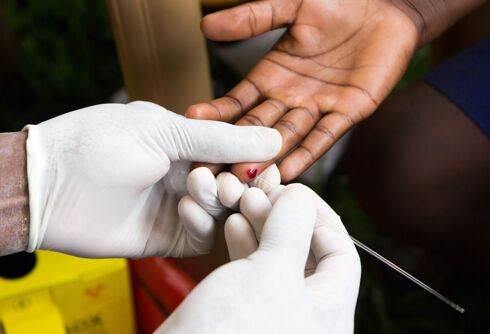All my life, I’ve heard, “High school never really ends. No matter where you go or what you do, there’s still a Cool Kids’ Table, and you’re either sitting at it or you’re not.”
And in most cases, I think this is true.
Related: Over 20 million Americans identify as LGBTQ people
Michael and I have plenty of gay friends, but frankly, we always felt like we didn’t really fit in with the LGBTQ community, which, for men, often seems to revolve around sex — and how you look and dress.
Never Miss a Beat
Subscribe to our newsletter to stay ahead of the latest LGBTQ+ political news and insights.
We’ve always preferred quiet dinners to pulsing nightclubs anyway.
We’re both writers, but we never really fit in among the social circles of New York publishing or the Los Angeles entertainment community either. Honestly, people could be pretty judge-y there too.
Then again, I do have a tendency to wear the wrong shoes. I’m kind of a dork.
I make friends easily enough, and I’m told I have decent social skills. But I know I’m not everyone’s cup of tea. And vice-versa! A lot of people bore me. So, except among my handful of really close friends, I’ve never felt like I truly fit in.
Not as a kid in my blue collar hometown of Tacoma, Washington, or later in my conservative private high school, or after that in my Jesuit Catholic college, and definitely not in ultra-liberal Seattle as an adult.
But I’d long since accepted I didn’t quite fit in. It was part of my identity, being a bit of a dork. I was proud to play Dungeons & Dragons. And I’d chosen as my partner, Michael, a guy who was a definite loner.
So it was strange back in 2018, after Michael and I sold our house and left to travel the world, when we stayed at our first “cohousing” facility, in Miami, Florida.
Cohousing means everyone has a small personal space — a bedroom or a small apartment — and they share a much larger common area. The point is to encourage interaction and create community. Cohousing is a pretty radical idea in individualistic, consumeristic, suburbanized America, but I loved the idea, at least in theory. This particular cohousing place had even been built specifically for digital nomads.
We were excited to see what nomading is all about, including cohousing. But when we first arrived in Miami, I was thinking, “I’m sure I won’t really fit in here either.”
The first week there, I went down to the kitchen to cook dinner for Michael and me. Before long, a man started cooking his own dinner next to me — a slight but handsome guy, around thirty, in loose cotton pants.
I was a nomad now, living in cohousing. The whole point was to meet people, so I figured I should at least introduce myself. So I steeled myself, turned to him, and said, “Hi, I’m Brent.”
His face immediately lit up. “Hello, I’m Xavier,” he said in a French accent.
We chatted a bit, and then he asked me, “What do you do?”
“Oh, I’m a writer,” I said. “Novels and screenplays.”
His soft brown eyes opened wide. “I love movies! Write anything I might have seen?”
“Probably not,” I said, embarrassed by my few produced screenwriting credits. “Hey, you’re French, right?” He nodded, so I said, “You must love French cinema.”
He rolled his eyes. “No. Too pretentious. I like popcorn movies.”
Now my eyes lit up.
As we talked, I learned he wasn’t crazy about France in general. He found his homeland snobbish and judgmental.
“I never really fit in back there,” he said. “So I started an online business, and now I’m a nomad. I came to Miami to learn to be a pilot.”
I liked that Xavier was such a mix of contradictions.
A few minutes later, he and I both finished cooking our respective meals. I’d made spaghetti for Michael and me, using sauce from a jar. Xavier had made fried fish served over a delectable ratatouille made from zucchini, eggplant, peppers, and fresh rosemary. Xavier may have hated France, but when it came to his cooking, he was still very much a Frenchman.
“How is that possible?” I said, pointing at his dinner, feigning outrage. “We started cooking at almost the same time! I swear to God, you started out with four ingredients. I see olives — and goat cheese! Where the hell did all that come from?”
He laughed, and I knew I’d made my first digital nomad friend. A week later, we went to a movie together, Ready Player One, the most popcorn movie we could find.

I quickly discovered that in cohousing, the common kitchen is a fantastic place to meet people, especially for an introvert like me.
Everyone has to eat. So people congregate in the kitchen to cook. But because everyone is there to cook, the pressure is low. If conversation happens, great, but if it doesn’t, there’s still a cutting board or a frying pan to focus on.
Every day, I met more nomads in that kitchen or eating our meals together at the outdoor dining table, which was tucked beneath a wooden gable dripping with bougainvillea. Once a week we had an organized group dinner, with a planned menu, but people had food to share at almost every meal.
Everyone was incredibly open and accepting, and they all had a different story to tell. Except, in a way, they weren’t really all that different.
Marcello, for example, had been so bored by his small Italian hometown that he’d literally gone to sea, taking jobs as a chef on different private yachts in order to see the world.
Over and over again, people told me how they’d been the “black sheep” back in their hometown in Finland, or Brazil, or Texas. They were the nerdy kid in school — the oddball, the loner, the outcast.
The dork.
Even from an early age, they knew they wanted more. So, one by one, they left to travel the world. Which, of course, made total sense. You don’t make the very extreme choice to leave everything and everyone you’ve ever known behind if you’re happy with your existing life.
And one day, something else occurred to me: for the first time in my life, there didn’t seem to be a Cool Kids’ Table. It wasn’t just because there was only that one long table under that beautiful gable dripping with bougainvillea.
It was the people, who were completely open and almost comically nonjudgmental. They’d been judged themselves as kids, but unlike some who are bullied as kids — especially in the gay community — they hadn’t grown up to become bullies themselves.
For the first time in my life, “status” didn’t seem to matter. In fact, I later learned that one of my new nomad friends was worth three billion dollars — but the only way you’d ever know it was that he paid for additional housekeeping of his room.
I quickly decided it was a lot harder to be an arrogant jerk when you’ve seen the world and opened yourself up to new people and new experiences. Or maybe travel simply attracts a chiller breed. The priorities are completely different. Less about money and “success,” more about successful life experiences.
Living with other nomads felt a little bit like jumping into the utopian world of Star Trek: it was a place where people had finally found a way to live together in a place of tolerance and mutual respect. And it rocked my world, because I’d long since come to the conclusion that the utopian world of Star Trek was bullshit, and most people are selfish, petty, judgmental assholes.
No matter. Person by person, story by story, it was dawning on me that I had arrived at The Island of Misfit Toys. Remember the Misfit Toys from that Christmas special, Rudolph the Red-Nosed Reindeer?
The toys were all misfits — “flawed” in some way: an airplane that can’t fly, a train with square wheels, a spotted elephant. As a result, they don’t fit in with the “normal” toys. It wasn’t until they got sent to The Island of Misfit Toys that they realized there were other misfits like themselves — that they weren’t alone.
Incidentally, what was A Dolly for Sue’s flaw? Doll-wise, she looks perfectly fine. But producer Arthur Rankin Jr revealed in a 2007 radio interview that she suffered from depression and low self-esteem, having been abandoned by her previous owner, Sue.
Heavy.
And I seriously can’t believe a character this obscure has her own Wikipedia page.
I’m also realizing for the first time ever that the Toy Story movies are totally ripping off this old Christmas special.
The point is, meeting other digital nomads for the first time, they struck me as a lot like Misfit Toys. We were Misfit Toys. Like those damn toys, it wasn’t until we met other nomads that most of us realized we weren’t alone — and we weren’t really even misfits.
Incidentally, if I were writing that television special today, I would have the Misfit Toys reject the whole paradigm of “toy servitude” and go off to become nomads together. Who needs children and their conditional “love”?! Let’s all go live in Tbilisi!
But hey, Rudolph was written in 1964. Baby steps.
In Miami, Michael and I realized we weren’t alone either. True, we were two Americans who’d always tried to reject consumerism and materialism. And gay guys who hated bars and nightclubs. Plus, Michael was a quirky loner, and I was an introverted Dungeons & Dragons-playing dork.
But it wasn’t that we didn’t fit in anywhere.
We were just Misfit Toys who hadn’t yet discovered the Island of Misfit Toys.
Honestly? Maybe there still was a Cool Kids’ Table — a nomad one — and I was finally sitting at it. But I don’t think so.
Either way, for the first time in my life, I did fit in. I had finally found my crew.
Since Miami, I’ve refined my Misfit Toy Theory of Digital Nomads a bit. We’re not all Misfit Toys. But I think most of us are. And even those who aren’t? A few bad apples aside, most of them are pretty decent too. I’m proud to have them as part of my crew.
This means it was still a heady experience, being middle-aged and realizing I wasn’t quite who I thought I was.
And even now, it’s a little scary to think that if I’d never left home to become a nomad, I might never have realized it at all.
Brent Hartinger is an author and editor, and the “Brent” in Brent and Michael Are Going Places, a couple of traveling gay digital nomads. Subscribe to their free travel newsletter here.
Don't forget to share:















